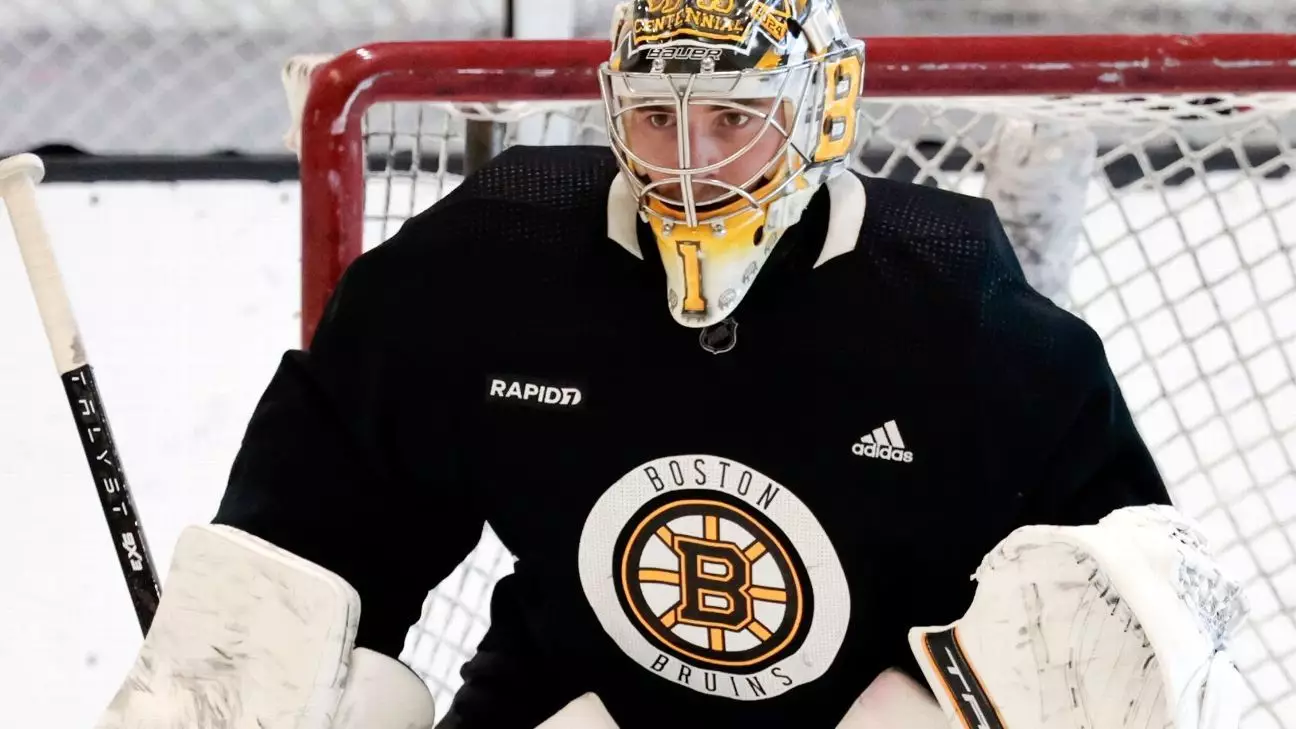The ongoing contract negotiation saga between the Boston Bruins and their promising young goaltender Jeremy Swayman has garnered significant attention, illustrating the complexities of professional sports contracts and the delicate balance between team management and player representation. As the tension escalated this week, both the team and Swayman’s agent, Lewis Gross, exchanged pointed remarks, raising questions about the future of Swayman within the organization.
As restricted free agent negotiations unfold, Swayman, 25, has made it clear he would not participate in the Bruins’ training camp until a new contract is finalized. This decision indicates not just a personal stance but an acceptance of the larger implications of professional contracts in hockey, where financial security is paramount. Bruins’ head coach Jim Montgomery confirmed that Joonas Korpisalo will be the starting goaltender for the team’s season opener, effectively demonstrating the team’s need to pivot amidst contract uncertainties.
During a preseason press conference, Boston Bruins president Cam Neely expressed mixed sentiments regarding the standoff. He suggested that Swayman genuinely desires to play for the Bruins, yet the absence of a completed deal was “unfortunate.” Neely’s comments further highlighted how negotiations can quickly spiral into public discourse, which can inadvertently harm the player, the team’s reputation, and the negotiation dynamics.
Public Claims and Disputes
In a now-infamous post-press conference statement, Swayman’s agent made a public defense of his client and contested the Bruins’ claims regarding a supposed contract offer of $64 million. Gross clarified that this figure had never been part of prior conversations, indicating a fundamental misalignment in expectations between the player’s representation and the team’s management. Such disputes are not merely technicalities; they speak to the pervasive mistrust that can emerge between teams and agents, complicating negotiations.
Gross’s decision to publicly address the issue contrasts with his typical approach of confidentiality during negotiations. This deviation signifies the heightened stakes involved, where reputations are on the line, and financial implications can alter career trajectories. It falls on general managers and team executives to tread carefully, as their public comments can reverberate throughout the negotiation process.
Swayman’s statistics position him as a promising asset for the Bruins, yet the complexity of market dynamics must also be evaluated. With a career record of 79-33-15, a .919 save percentage, and a 2.34 goals-against average, it’s clear that he is a capable goaltender. The reported contract demands from Swayman’s camp — suggesting a potential figure of $9.5 million — indicate a desire to position him among the highest-paid goalies in the league, with aspirations of resetting the goaltender market.
On the flip side, Bruins general manager Don Sweeney’s choices, including the offseason trade of Linus Ullmark, are under scrutiny. Sweeney’s assertion that both the trade and Swayman’s ongoing negotiations are separate issues draws skepticism from analysts and fans alike. The perception that Sweeney lacked foresight by not securing Swayman before making a significant trade can lead to increased pressure and criticism of team management.
As Swayman navigates this tumultuous landscape, he and his representation are surely weighing the contracts of fellow goaltenders. Comparisons to established players like Carey Price and Sergei Bobrovsky, who command some of the highest annual salary figures in the NHL, are not merely a matter of numbers; they also represent milestones that have significance beyond simple statistics, symbolizing a player’s perceived value in the league.
The complexity escalates with the Bruins reportedly offering Swayman a lengthy eight-year deal, yet there remains a substantial gap in expectations regarding its financial terms. Insights from league trends suggest that teams will evaluate contracts not only based on individual performance but also on salary cap implications, complicating matters even further.
As Swayman enters the final stages before the critical December 1 deadline, where he must agree to a new contract in order to secure a spot on the roster for the season, both sides must reevaluate their positions. The potential ramifications of this standstill could ripple through the Bruins’ season and impact Swayman’s long-term career trajectory.
In a world where teamwork and cooperation are essential, this contract stalemate underscores the importance of effective communication and negotiation strategies. The looming questions will likely not just focus on Swayman’s eventual signing but also on how the Bruins will manage their roster effectively while attempting to resolve the broader implications of this divisive negotiation. Ultimately, finding common ground will be key in determining the next chapter in the Bruins’ pursuit of success within the tightly contested NHL.


Leave a Reply